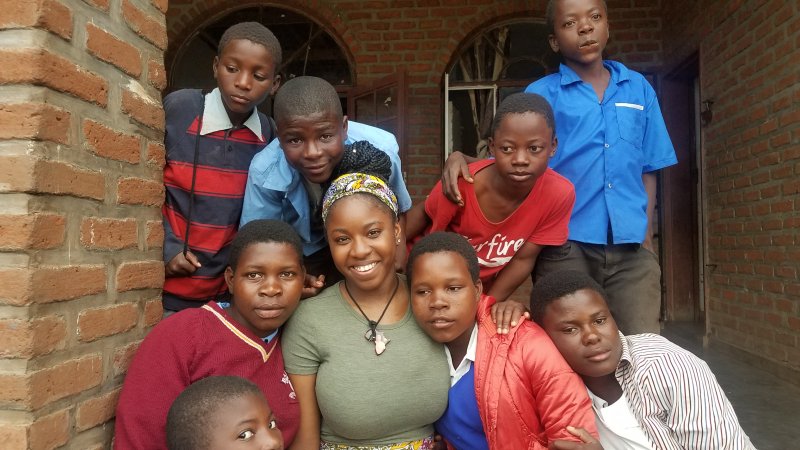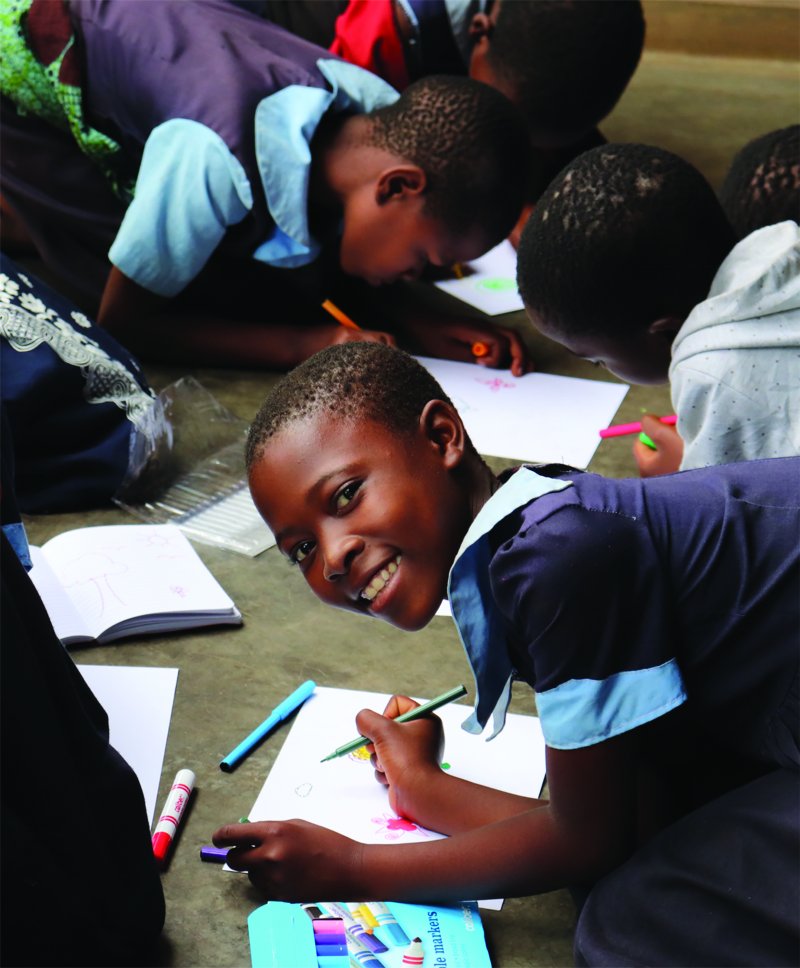Lending a hand in Malawi
Students return from international service learning with new purpose.

Amanda Duncan ’16 remembers searching for supplies while visiting stores in Malawi last summer with her fellow College of Community and Public Affairs (CCPA) students.
“I wish there was a Walmart,” she said to herself.
Duncan, a master’s student studying social work, cried when she entered one of the retail giant’s stores upon returning to the United States a month later.
“I thought: ‘Do we think that this is OK? Do we need all of this?’”
Duncan is just one of the CCPA students and faculty members whose lives have been affected by the college’s partnership with the Malawi Children’s Mission (MCM), a nonprofit organization that provides educational, nutritional, healthcare and emotional support to orphaned and vulnerable children in three communities of the southeastern African nation.
Binghamton University groups led by CCPA Associate Professor Lisa Blitz have spent the past two summers in Malawi, supporting the MCM. The experiences have been life-changing for students.
“They all believe they have been transformed,” Blitz says. “It’s deeply meaningful. [Our students] believe that what they have learned will make them better professionals in whatever they pursue.”
A Binghamton connection
The Malawi Children’s Mission was co-founded in 2007 by Steven Koffman, son of longtime Binghamton entrepreneurs and philanthropists Ruthanne Koffman ’82, MA ’84, and the late Burton “Bud” Koffman.
Steven Koffman said his parents and grandparents instilled in him the importance of giving back to the less fortunate and to the community.
“I’d like to leave the planet a better place than I found it,” says Koffman, who viewed poverty on a global scale while working in Hong Kong and traveling in Asia in the late 1980s.
In the mid-2000s, after receiving his MSW from Columbia University and interning at UNICEF, Koffman reconnected with Sean Robinson, a friend from his days in Hong Kong. Robinson’s daughter was marrying a Malawian man, so Koffman and Robinson decided to pursue a project to help one of the world’s poorest countries.
The pair engaged village elders and realized that an entire generation had been lost to HIV/AIDS. Grandparents or aunts were raising children. With the absence of electricity and running water, MCM chose three villages and 50 children to support through a nutritionally based food program. A building with a kitchen, offices and playrooms was constructed. Tutoring, mentoring and outdoor activities were offered.
“We began feeding 50 kids, one day a week,” Koffman recalls. “Then we went to three days and then five days. We now feed 150 children five days a week.”
Despite the success of the feeding center, Koffman knew that “education is the key to breaking the cycle of poverty anywhere in the world.”
“The kids were doing well health-wise, but there was something lacking,” he says. “The schools are deplorable. No supplies, no desks, few teachers, buildings in horrific conditions. There was no motivation for the kids to go to school.”
MCM built a school and now offers K-8 education. The staff includes teachers, cooks, a nurse and a social worker.
“It’s been a tremendous ride,” says Koffman, his voice breaking with emotion. “I feel extremely humbled and grateful that we are in a position to do this for these kids.”
On the ground
The first seed of an MCM-CCPA partnership was planted by Ruthanne Koffman following her MCM trip to Malawi in 2014. Upon her return, she shared her excitement about the experience with CCPA Dean Laura Bronstein, who immediately asked if they wanted a University partner. In January 2015, Steven Koffman brought Bronstein and Blitz to Blantyre, Malawi, for a two-week visit, sealing the partnership.
Blitz returned to Malawi in July 2015 to establish a participatory action research project and was so impressed by the potential of working with MCM that she phoned fellow CCPA faculty member Denise Yull minutes after getting off a plane at John F. Kennedy International Airport.
“You have to come to Malawi,” Blitz recalls telling Yull. “You can’t say no!”
Blitz and Yull, an associate professor of human development, led a group of seven students the following July. Eighteen students accompanied Blitz and Youjung Lee, an associate professor of social work, in July 2017.
While they attended prep sessions before departing the United States, nothing could truly prepare the students for what they saw upon arriving in Malawi.
“There is a shock at the level of material poverty and financial poverty,” Blitz says. “But there is also a deep appreciation that happens almost simultaneously for the resilience and for how genuine and joyful the people are.”
“I knew it would be hard to see the things we were going to see — and I had no idea what they would be,” Duncan says.
The students’ shock subsided when they met the Malawian children.
“With the children, you are swarmed by love the minute you get there,” Duncan says. “We all had groups of children who hung around us for the three weeks. My little girl’s name was Aisha. She keeps me going. I have her picture on my laptop. When I’m writing a paper or get frustrated, I look at her picture and think: ‘Life’s not so bad.’”
Thomas Mastro ’16, a master’s student studying student affairs administration and public administration, was on the 2017 trip.
“The boy attached to my hip was Chimwemwe,” he says. “His group of friends would play soccer with me. They knew when we would show up each morning. It was a rush of kids welcoming us every day.”
The projects
One example of the CCPA group’s asset-based community development was helping a women’s collective make and sell soap. The project could only work if the villagers in the three communities worked as one, Blitz and Yull say.
“It was an amazing moment to have these different groups come together for an enterprise in which resources were so scarce,” Yull adds.
Binghamton students spent days taking Malawian children to places where they could learn about careers. They visited teachers, police officers, nurses, hotel workers, and even traveled to an airport and watched a plane take off.
“Some of the kids had never been outside of their village or in a motorized vehicle,” Blitz says. “People were so excited to talk to the children and discuss their work.”
“It was exciting to see the kids get on the bus,” Yull says. “They were dancing! … They’ve weathered the storm and found joy. With us and all of the trappings of the things we have, we sometimes have a difficult time finding joy.”
Mastro and Duncan both were impressed by the children’s appreciation of their MCM education.
“When you look at MCM, you see that these students understand the value of what’s going to happen if they get through their education,” Mastro says. “We saw that across the board.”
A continuing partnership
More than a dozen students — including Duncan — and faculty members will travel to Malawi in July.
“I can’t make that much of an impact on this world, but I can love everybody I meet and show kindness to those who need it,” Duncan says. “I knew that before I went to Malawi, but the power of it didn’t solidify until I saw individuals starving, but also a community thriving.”
Blitz, Yull and Lee all want to find ways for trip participants to promote the commitment to global citizenship when they return to Binghamton University. They also hope to develop internships within MCM and collaborations with higher-education institutions in Malawi.
“I can take you around Binghamton and show you the work that needs to be done,” Yull recalls telling students on the way home. “You don’t have to go to Africa to work with people who are struggling and need help. We need to take that energy, come home and go to work.”
Exposing “young, smart students” to a different part of the world is a “win-win” for MCM, CCPA and Binghamton University, Koffman says.
“The way the University has embraced the Malawi Children’s Mission — I couldn’t have imagined it any better,” says Koffman, who hopes to someday have an MCM student attend Binghamton University. “It continues to grow and be fulfilling for both the children and educators in Malawi and the students and professors at Binghamton.”
For Mastro, CCPA students are “agents of change,” and the Malawi program brings a global perspective to the work that originates at the University Downtown Center.
“You are able to apply what is learned in the classroom to a hands-on, real-life, raw experience,” he says. “It’s impactful for the children and the MCM professionals in Malawi. You see the benefits in your own academics and reflections.”



